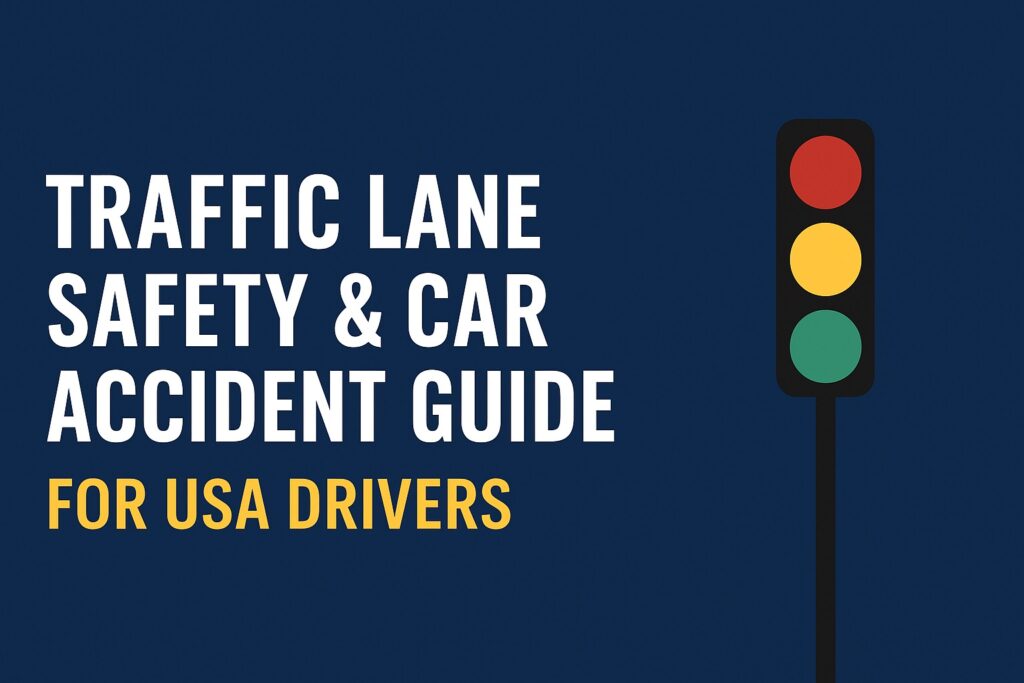(Traffic Lane Safety & Car Accident Legal Guide for Drivers in the USA)
🛣️ Introduction: Why Traffic Lane Safety Matters
Every day, millions of drivers take to the roads, confident in their driving skills. Yet, even experienced drivers can make one simple mistake: failing to stay in their lane. A brief lapse in attention or an improper lane change can turn a routine drive into a life-altering accident.
Traffic lane discipline is not just about following painted lines; it’s about protecting lives. According to studies, nearly 60% of highway accidents result from improper lane changes, distracted driving, or speeding.
Accidents caused by lane violations can lead to serious injuries, vehicle damage, and legal complications. Understanding traffic lane rules, defensive driving, and your legal rights is essential for every driver in the USA.

⚠️ How Lane Mistakes Lead to Traffic Lane Safety Risks
Many drivers underestimate the dangers of improper lane changes. Even a few seconds of distraction can trigger a major collision.
Common Causes of Lane Accidents
- Using mobile phones or other distractions while driving
- Changing lanes without signaling
- Speeding in traffic or on highways
- Tailgating or cutting across lanes abruptly
- Driving under fatigue or impairment
Example: At 60 mph, a two-second distraction means your vehicle travels 176 feet without full attention — enough to cross lanes and cause an accident.
🚦 Traffic Lane Safety Rules for Drivers in the USA
Lane discipline in the USA is governed by state traffic laws, which require drivers to follow lane markings, speed limits, and signaling rules.
Key Lane Rules
- Use turn signals before every lane change.
- Do not cross double or solid lines illegally.
- Keep right except when overtaking (on multi-lane highways).
- Do not drive in shoulders unless directed by authorities.
- Follow lane markings at intersections and roundabouts.
Violating lane rules may result in fines, points on your license, and, in the case of accidents, legal liability.
🧠 Understanding Unsafe Lane Changes and Traffic Lane Safety
Drivers often break lane rules due to impatience, stress, or overconfidence. Many think, “I’ve driven for years, I can handle it.” Unfortunately, this mindset leads to preventable accidents.
Recognizing risky behavior and practicing defensive driving reduces accidents and ensures safety on American roads.
🚗 Defensive Driving: Protect Yourself and Maintain Traffic Lane Safety
Defensive driving involves staying alert, anticipating other drivers’ actions, and preparing for unexpected situations.
Defensive Driving Tips
- Maintain a safe following distance (3-second rule).
- Check mirrors and blind spots before changing lanes.
- Reduce speed in adverse weather conditions.
- Expect others to make mistakes and react safely.
- Stay focused and avoid multitasking while driving.
🏥 What To Do Immediately After a Lane-Change Accident
If you are involved in a lane-related accident in the USA, follow these steps:
- Stay calm and check for injuries.
- Move vehicles to a safe location if possible.
- Call emergency services and report the incident.
- Document the scene with photos, videos, and witness information.
- Exchange insurance and contact details with the other driver.
- Notify your insurance company promptly.
⚖️ Legal Rights After a Lane-Change Accident
Even careful drivers can become victims of someone else’s lane violation. Knowing your legal rights ensures you receive fair compensation.
Legal Options in the USA
- File a claim for medical bills and vehicle damage.
- Pursue negligence claims if the other driver violated traffic rules.
- Consult a car accident lawyer for guidance and representation.
For a complete guide on legal steps and accident lawyer advice, visit: Car Accident Lawyer in Edinburg – Complete Guide
🧾 Insurance Claims and Traffic Lane Safety Mistakes to Avoid
- Never leave the accident scene without filing a report.
- Do not accept cash settlements without documentation.
- Do not admit fault verbally or online.
- Notify your insurance company immediately.
🚘 Technology That Supports Traffic Lane Safety
Modern vehicles in the USA often include Lane Departure Warning (LDW) and Lane Keeping Assist (LKA) systems. Dashcams and AI monitoring systems help track lane violations and provide evidence in case of accidents.
🌍 Global Road Safety Perspective on Traffic Lane Safety
Countries like Japan and Sweden have reduced lane accidents using strict enforcement, driver education, and technology. In the USA, awareness and discipline are key to safer roads.
🧩 Conclusion: Stay Focused and Protect Yourself
Maintaining proper lane discipline is more than a rule — it is a life-saving habit. A small mistake can lead to serious consequences, including injury, financial loss, and legal challenges.
- ✅ Stay alert while driving
- ✅ Signal every lane change
- ✅ Respect lane boundaries
For more details about legal help in Edinburg, see this Edinburg Car Accident Lawyer guide.
FAQ: Traffic Lane Safety, Car Accidents & Legal Rights in the USA
Ans: Traffic lane safety means following lane markings, signaling before changing lanes, keeping a safe distance from other vehicles, and obeying traffic rules to prevent accidents.
Ans: Common causes include distracted driving (using phones or eating), improper lane changes, speeding, tailgating, and driving under fatigue or influence.
Ans: Stay calm, check for injuries, move vehicles to a safe location, call emergency services, document the scene, exchange details with the other driver, and notify your insurance company.
Ans: Yes. You can file a claim for medical expenses and vehicle damage, pursue negligence claims, and consult a car accident lawyer to protect your rights.
Ans: Defensive driving keeps you alert, helps anticipate other drivers’ mistakes, promotes safe distances, and reduces the risk of collisions through proactive responses.
Ans: Yes. Many vehicles have Lane Departure Warning (LDW) and Lane Keeping Assist (LKA) systems that alert drivers when drifting from a lane and can even correct steering automatically.
Ans: Do not leave the scene without reporting, never accept cash settlements without documentation, avoid admitting fault, and notify your insurance company immediately.